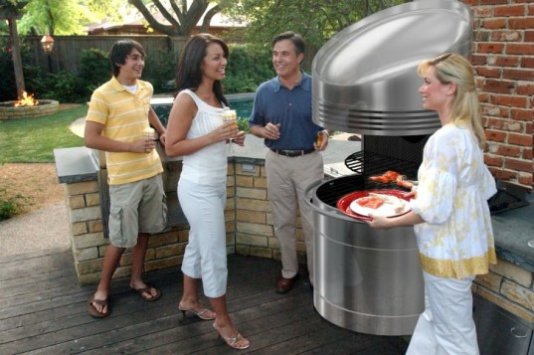- About
- Topics
- Picks
- Audio
- Story
- In-Depth
- Opinion
- News
- Donate
- Signup for our newsletterOur Editors' Best Picks.Send
Read, Debate: Engage.
| August 07, 2013 | |
|---|---|
| tags: | #carbon emission, #eco-efficiency |
| located: | Germany, Italy, France, United Kingdom |
| by: | Itai Lahat |
Whether you prefer charcoal, wood chips or propane, grilling releases emissions and contributes to poor air quality. Up until now, solar powered grilling has required, as you might expect, the sun, which means traditional fuel-fired grills are required after sunset. But new solar technology developed by MIT professor David Wilson could bring a nighttime solar-powered grill to the market very soon; an invention also of great benefit to those in developing nations who rely on wood to cook all their food.
Wilson’s technology harnesses the sun and stores latent heat to allow cooking times for up to an amazing twenty five hours at temperatures above 230 degrees Celsius. The technology uses a Fresnel lens to harness the sun’s energy to melt down a container of Lithium Nitrate. The Lithium Nitrate acts as a battery storing thermal energy for 25 hours at a time. The heat is then released as convection for outdoor cooking.
“There are a lot of solar cookers out there,” says Wilson, “but surprisingly not many using latent-heat storage as an attribute to cook the food.” Wilson developed the idea after spending time in Nigeria, where wood is used for cooking, which causes a number of problems. Not only is cooking with firewood leading to respiratory illnesses, but is also increasing the rate of deforestation and women are being raped while searching for wood.
And if you are looking for more reasons to switch to solar grills, then a new study will certainly provide you with them. Findings from the American Journal of Clinical Nutrition confirmed the link between heterocyclic amines (HCAs), a carcinogen found in grilled meat and fish, with a higher risk of breast, stomach, pancreatic, and colorectal cancer.
HCAs form in meats and fish cooked at high temperatures when amino acids and creatine (a chemical in muscle) react. Another nasty culprit, PAHs (polycyclic aromatic hydrocarbons) form when fat drips off the meat into the flame or heating element. PAHs rise in the smoke and deposit on the food. Yeah, lots of delicious stuff is bad for us, but can be avoided with solar grilling.
Image credit: MIT
By copying the embed code below, you agree to adhere to our republishing guidelines.

